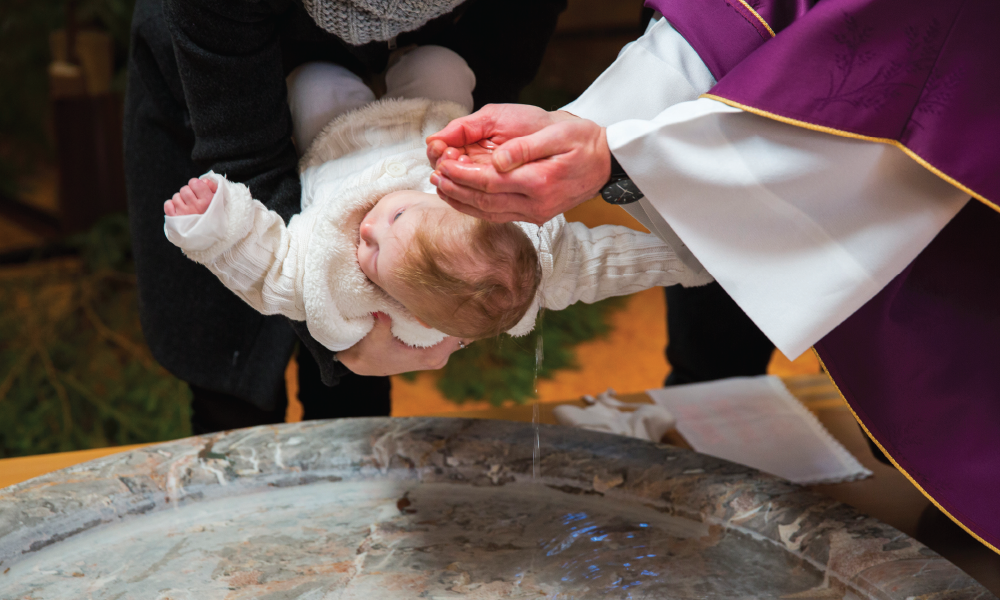
The biblical basis for the sacraments of initiation
In December 1545, the Council of Trent began its work of clarifying doctrine and purifying the inner life of the Church as a response to challenges presented by the Protestant Reformation. When it finally closed in 1563, the Council of Trent pronounced, among many other things, that there were seven sacraments (baptism, confession/penance, confirmation, Eucharist, matrimony, holy orders, and anointing of the sick) – all of which were instituted by Jesus Christ. However, a review of the New Testament would yield no such listing of sacraments. Does this mean that the seven sacraments are not biblically based? What exactly is the biblical evidence that Jesus instituted them?
In December 1545, the Council of Trent began its work of clarifying doctrine and purifying the inner life of the Church as a response to challenges presented by the Protestant Reformation. When it finally closed in 1563, the Council of Trent pronounced, among many other things, that there were seven sacraments (baptism, confession/penance, confirmation, Eucharist, matrimony, holy orders, and anointing of the sick) – all of which were instituted by Jesus Christ. However, a review of the New Testament would yield no such listing of sacraments. Does this mean that the seven sacraments are not biblically based? What exactly is the biblical evidence that Jesus instituted them?
The sacraments of initiation
Our exploration begins with the sacraments of initiation: baptism, confirmation and the Eucharist. These sacraments “lay the foundations of every Christian life,” according to the Catechism. (1212) We are reborn through baptism, strengthened by confirmation and nourished by the Eucharist. Each is supported by sacred Scripture.
Baptism
The three Synoptic Gospels (Matthew, Mark and Luke) explicitly recount the story of Jesus’ baptism by John the Baptist. The Gospel of John (1:32) is more implicit in its approach as John the Baptist testifies having seen the Spirit descend upon Jesus like a dove and remain upon him. The Catechism of the Council of Trent points to this event as indicating Christ instituted the sacrament of baptism.
However, there is additional evidence. The Gospel of John says that Jesus also baptized others (3:22) after delivering his famous discourse about the need to be born again from above to Nicodemus. So we see Jesus instituting the need for baptism through his actions. Jesus also provided evidence through his words. In Matthew 28:18-20 Jesus, following his resurrection, commands the Apostles to baptize all nations in the name of the Father, Son and Holy Spirit. He communicates the importance of baptism when he tells his Apostles in Mark 16:16 that those who believe and are baptized “will be saved.”
Confirmation
Interestingly, the Apostles did not immediately act upon Jesus’ great commission to preach the Good News and baptize all nations. Before his Ascension, Jesus told the Apostles to remain in Jerusalem for a while longer. Why? They had not yet received the Holy Spirit, whom Jesus had promised to send. (Acts 1:4-5, see also John 14:16) As they huddled in their Upper Room in Jerusalem, the Holy Spirit came to rest upon them like “tongues of fire.” (Acts 2:3) The Church was born on that Pentecost, which is considered Jesus’ institution of the sacrament of confirmation. One might also reference Acts 8:14-16 for scriptural evidence that the early Church celebrated the sacrament of confirmation.
Eucharist
The biblical evidence for Christ’s institution of the sacrament of the Eucharist is, perhaps, the clearest to spot. The Catechism (1323) states that Jesus “instituted the Eucharistic sacrifice of his Body and Blood” at the Last Supper. In the three Synoptic Gospels, Jesus instituted the Eucharist at the Last Supper (Mt 26:26-28; Mk 14:22-24; Lk 22:17-20) and in John, chapter 6, during the Bread of Life Discourse, Jesus says: “For my flesh is true food, and my blood is true drink. Whoever eats my flesh and drinks my blood remains in me and I in him.” (55-56)
Did You Know…
The Protestant Reformation began with the publication of Ninety-Five Theses on Oct. 31, 1517, by Martin Luther. Among other things, Luther argued that the seven sacraments should be reduced in number. He posited baptism, penance, and the Lord’s Supper as the only proper sacraments. This is why the Council of Trent felt it necessary to clarify and reiterate that there are seven. Eventually, penance was also cut and so, today, Protestant denominations such as Reformed, Lutheran and Anglican recognize only baptism and the Lord’s Supper as sacraments.
Pope Francis on the sacraments of initiation
Baptism
“Baptism permits Christ to live in us, and to live united with him, in order to collaborate in the Church, each according to his or her own condition, to the transformation of the world.” (Apr 2018 Gen Aud)
Confirmation
“This [Holy] Spirit acts with strength within us, within all people and during one’s whole life, when we receive him in our hearts, Christ makes himself present and takes shape in our lives.” (Jan 2014 Gen Aud)
Eucharist
“To let ourselves be nourished by the Bread of Life means to be in tune with the heart of Christ, to assimilate his choices, thoughts, behaviors.” (Aug 2015 Angelus)
Doug Culp is the chancellor for the Catholic Diocese of Lexington.



